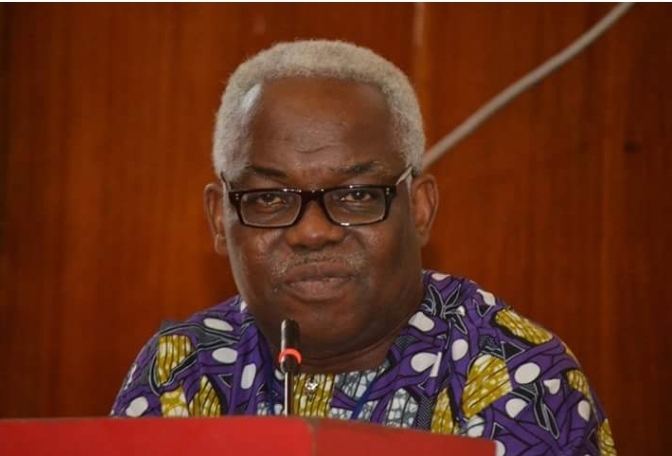By Okoh Aihe
There is story that is permanently frozen in my brain. In those terrible days of the Nigerian Civil War, when Prof Chinua Achebe had gathered himself together to break news of Christopher Okigbo’s death at the war front to the family, his three-year-old son, Ike, screamed: “Daddy, don’t let him die!”
Okigbo knew how to dominate his environment. He was bold, brilliant and had lots of mischief. Those who ever met him yearned for his effervescent presence. In August 1967, he fell in a Civil War that has hardly cured the nation of its madness. And the innocent three-year old cried to the father to save his life, because Okigbo too, was his friend. A friend of the three-year old!
This story is told in Achebe’s There Was A Country. Both Okigbo and Achebe are gone but they left their marks. Each time I see a life or situation that is threatened, the frozen line comes alive, Don’t let him die.
The title of this piece, with all humility, owes its origin to the great work of one of the world’s greatest story tellers, Achebe. Slightly adapted and compressed, my appeal is: Don’t let 9MOBILE die.
9MOBILE runs a tragic story at the moment, nothing edifying about it at all. The justification could be that every business has a downtime. But this is more than a downtime. The organisation is bleeding and there is the need for inclusive search for solutions to keep the business running.
It is a private business some suggestions would come. But wait till a private business goes down, then you will begin to understand the meaning of a private business that has become a public trust because of its impact on the people.
The story of 9MOBILE which started out in Nigeria as Etisalat once read like a Nollywood story. You can bet former President Olusegun Obasanjo, hailed as OBJ by both lovers and detractors, to have his imprimatur on every good story associated with the renaissance of the telecommunications industry in Nigeria. Years after MTN, Airtel, which also started business as Econet Wireless, and Glo launched mobile services in the country, OBJ, the businessman he was as a leader, was still able to convince some businessmen in the Middle East to invest a mouth-watering sum of $400m in Nigeria. The amount was for a Universal Access Service License (UASL), which also included frequency in the 1800MHz GSM band.
Coming under the vehicle of Mubadala, a big investment company from the United Arab Emirates, the organisation readily found traction with a Nigerian company, Emerging Markets Telecommunications Services (EMTS), both choosing Emirates Telecommunications Company’s Etisalat to deliver their services. Commercial services commenced in Nigeria in October 2008. It was like marriage made in heaven. Etisalat is big in the Middle East and easily made impact in Nigeria, even having to proudly rub shoulders with Airtel and Glo which came into the market in 2001. MTN was already miles ahead.
Something happened that was not easily spotted. Whatever Mubadala brought into Etisalat Nigeria as investment was through debt financing; meaning that the money would have to be paid back by the Nigerian operation as loan attracting the agreed interest.
Before long Etisalat was exposed to a debt of $1.2bn, owed to local banks and lenders. The company was in crisis, leading to the exit of Mubadala. But Mubadala had collected its own money, leaving the Nigerian owners in limps.
There was a glimmer of hope however. The management was upbeat even in the throes of crisis. When the name change from Etisalat Nigeria to 9MOBILE occurred in July 2017, the organisation had over 20m lines. Not many operators in Africa can boast of that figure. It is pertinent to observe though that there was a sale that created more ghosts for 9MOBILE.
A question here is, have those ghosts emerged from the shadows to haunt 9MOBILE? As I write this material, not so many industry players see a bright future for the organisation. The company remains in debt, according to industry sources. Plus other encumbrances, it is owing about $140m to Huawei and another N40bn to IHS, its passive infrastructure supplier. IHS is in charge of towers and security for 9MOBILE’s operations across the country.
The subscriber base has also plummeted, down to 12, 789, 344 lines by the end of last year which translates to a market share of just 6.55 per cent, according to the Nigerian Communications Commission (NCC). This is hardly the story that should be expected in a competitive market, like Nigeria.
From all indications, 9MOBILE needs understanding and support from all the various stakeholders, so that it can muster enough gusto and courage once more to begin to meet its obligations to its creditors, suppliers and services providers. The regulator should pay more attention to the corporate governance activities of the mobile operators in order to keep abreast with their financial health. Or know when some tricks are being played.
In spite of the excitement I see around me, the future I see of the telecommunications industry doesn’t present a sustained hope. Except there is a turn, some analysis might be needed at some point to warn those who build imaginary bridges of hope in the skies.
For Tunde Fatunde
The death of Prof Tunde Fatunde last week crudely reminded me how much one can fight through life and at the end still ask the inevitable question, did I succeed? Fatunde was a fighter and didn’t know how to retreat from any battle irrespective of the danger. From the early eighties when we joined the University of Benin, Fatunde already picked a position to fight on the side of the people with the various tools at his disposal, including his plays that were populist. In one of those lines he put in my mouth as Hassan in No More Oil Boom, Fatunde wrote: “Our working people eat from dustbins because people like Alh. Bauchi, Prof Owokunle and others have introduced into the country the social practice of American businessmen and contractors. In the nearest future the workers and farmers of this country will no longer eat from dustbins. Our People say: When there is life there is hope. I want you to note this important fact. Nigeria is not fore sale.”
With the Uniben auditorium filled every night, those words lit some kind of fire on the campus and sent ripples even beyond. Fatunde’s words troubled the wicked in the land, and even now that he is gone, they will remain haunted by the arrows in the words. Unfortunately wickedness remains an evergreen totem and poverty has become even more epidemic. The good news is that evil has never broken the strong will of a regenerated people. Which is why Fatunde would have left with a wry smile that he did his best to heal a troubled nation. Your efforts are appreciated and may your journey across the divide be good. Go well and furnish Prof Festus Iyayi with happenings in the land.

